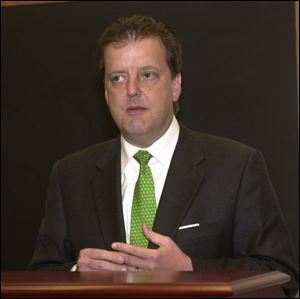
Post-Taliban void must be filled, UT group told
4/26/2002
William “Spence” Spencer warned an audience at the University of Toledo college of law that properly filling the power vacuum that will occur now that the Taliban has been removed from power is a prerequisite to establishing security for the region.
To bring a lasting peace to Afghanistan, the United States needs to supplement its military policy with a real, informed political strategy, a human-rights activist who recently spent two weeks in the war-torn country said yesterday in Toledo.
William “Spence” Spencer warned an audience at the University of Toledo college of law that properly filling the power vacuum that will occur now that the Taliban has been removed from power is a prerequisite to establishing security for the region.
“There's a vacuum that has to be filled. It will not be filled by the law. It will be filled by warlords or terrorists or drug barons,” Mr. Spencer said.
The former foreign service officer, who served in posts including Sarajevo and Bosnia and who was special adviser to the assistant secretary of state for democracy, human rights, and labor, was part of a team that compiled a report assessing the state of Afghanistan called “Filling the Vacuum: Prerequisites to Security in Afghanistan.”
So far, Mr. Spencer said, policy has been dominated by the Department of Defense. A suitable political response has not been defined, he said.
“I think that the real goal is to have an Afghanistan that will no longer create problems for the rest of the world,” he said. “That's the bottom line.”
Mr. Spencer described a highly undeveloped country with no phones or Internet access and no reliable electricity. And while the central government is in the capital of Kabul, most of the country is ruled by warlords, he said.
“There's no law at all,” he said. “The court system is there, but it doesn't recognize any central authority.”
Three different systems of law - tribal, Islamic, and the formal state law - exist simultaneously in Afghanistan. Many of the state's codified laws, however, were burned by the Taliban, he said.
The country has been ravaged by conflict since the Soviet Union invaded in 1979, and Mr. Spencer said he doesn't see it letting up anytime soon.
“I think it's going to go on for along time,” he said. “Nobody has any central authority.
Mr. Spencer, who works for International Resources Group, a professional services firm, has prior experience working at the National Security Council as a senior duty officer in the White House Situation Room.